Business Law: Analyzing Contract Act and Exclusion Clause Validity
VerifiedAdded on 2023/05/31
|7
|1922
|401
Case Study
AI Summary
This case study delves into a business law scenario concerning a transaction at a café, analyzing key elements of contract law such as offer, acceptance, consideration, intention to create legal relations, and legal capacity. It examines the validity of an exclusion clause printed on a café ticket, assessing its enforceability under common law and the Australian Consumer Law (ACL) 2010. The analysis determines whether the café can be held liable for negligence despite the presence of the exclusion clause, considering implied consumer guarantees and the safety of goods for consumption. Ultimately, the study concludes that the exclusion clause is unenforceable and the café is liable for damages suffered by the consumer due to a faulty product, emphasizing the importance of adhering to consumer protection laws.
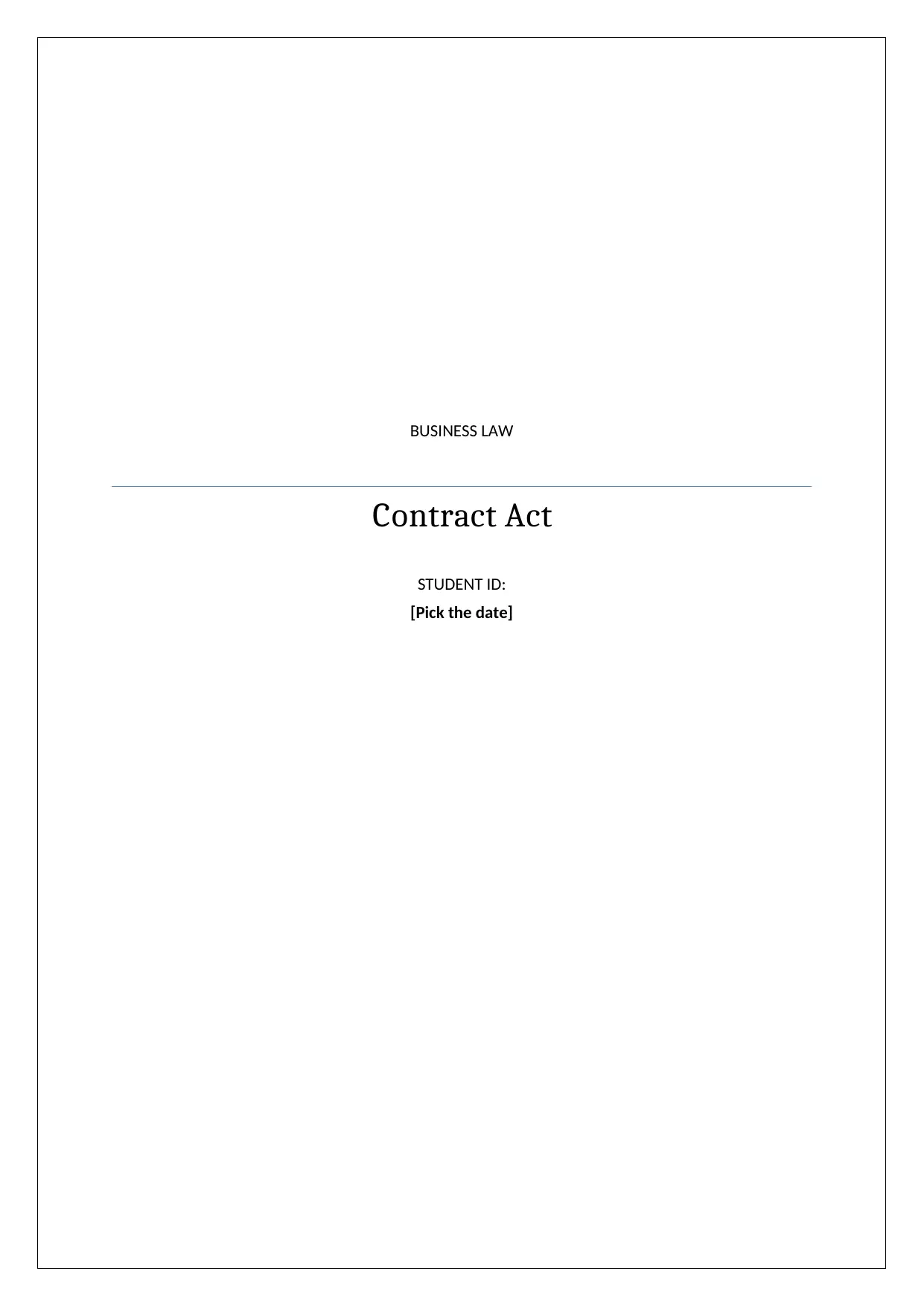
BUSINESS LAW
Contract Act
STUDENT ID:
[Pick the date]
Contract Act
STUDENT ID:
[Pick the date]
Paraphrase This Document
Need a fresh take? Get an instant paraphrase of this document with our AI Paraphraser
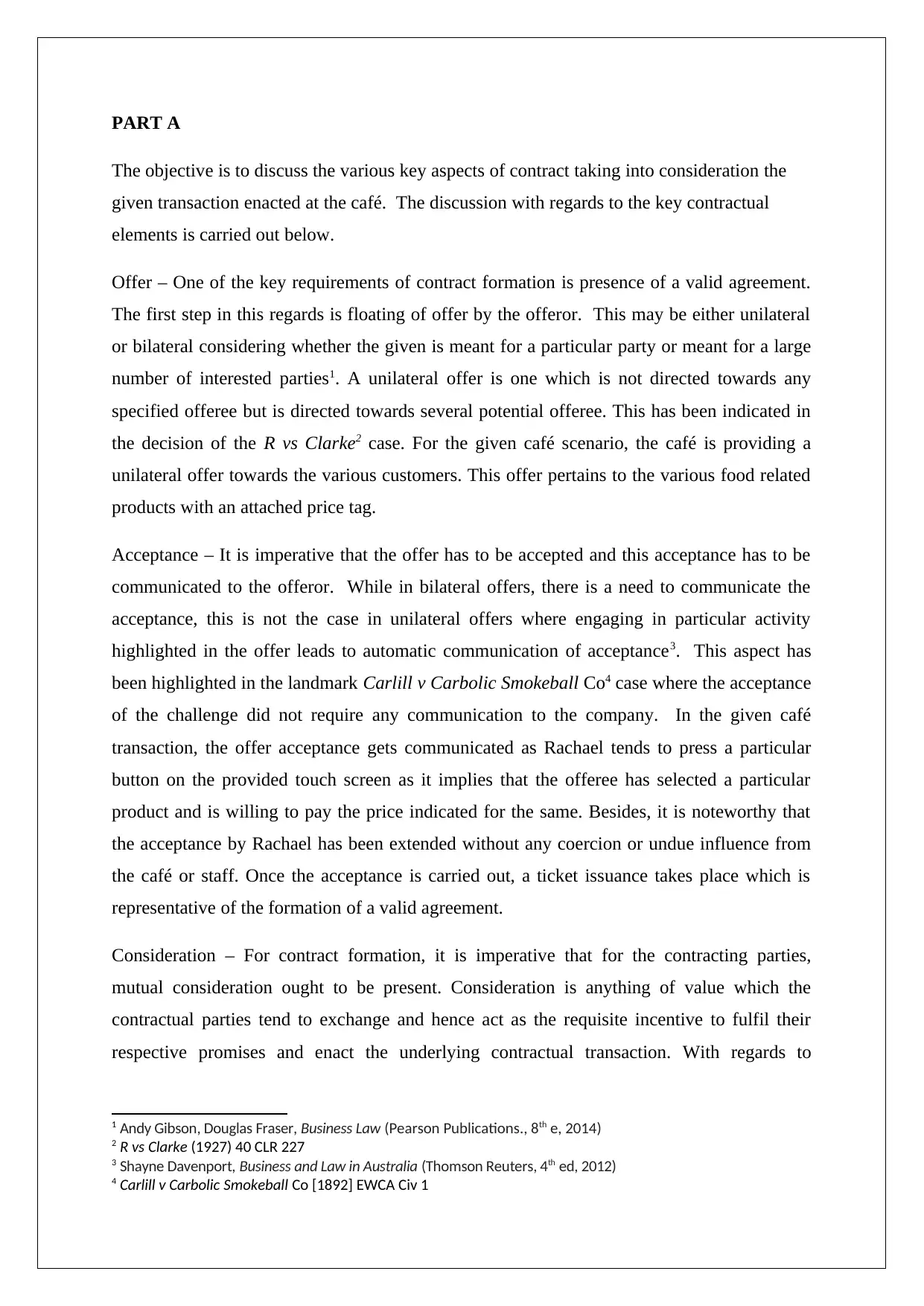
PART A
The objective is to discuss the various key aspects of contract taking into consideration the
given transaction enacted at the café. The discussion with regards to the key contractual
elements is carried out below.
Offer – One of the key requirements of contract formation is presence of a valid agreement.
The first step in this regards is floating of offer by the offeror. This may be either unilateral
or bilateral considering whether the given is meant for a particular party or meant for a large
number of interested parties1. A unilateral offer is one which is not directed towards any
specified offeree but is directed towards several potential offeree. This has been indicated in
the decision of the R vs Clarke2 case. For the given café scenario, the café is providing a
unilateral offer towards the various customers. This offer pertains to the various food related
products with an attached price tag.
Acceptance – It is imperative that the offer has to be accepted and this acceptance has to be
communicated to the offeror. While in bilateral offers, there is a need to communicate the
acceptance, this is not the case in unilateral offers where engaging in particular activity
highlighted in the offer leads to automatic communication of acceptance3. This aspect has
been highlighted in the landmark Carlill v Carbolic Smokeball Co4 case where the acceptance
of the challenge did not require any communication to the company. In the given café
transaction, the offer acceptance gets communicated as Rachael tends to press a particular
button on the provided touch screen as it implies that the offeree has selected a particular
product and is willing to pay the price indicated for the same. Besides, it is noteworthy that
the acceptance by Rachael has been extended without any coercion or undue influence from
the café or staff. Once the acceptance is carried out, a ticket issuance takes place which is
representative of the formation of a valid agreement.
Consideration – For contract formation, it is imperative that for the contracting parties,
mutual consideration ought to be present. Consideration is anything of value which the
contractual parties tend to exchange and hence act as the requisite incentive to fulfil their
respective promises and enact the underlying contractual transaction. With regards to
1 Andy Gibson, Douglas Fraser, Business Law (Pearson Publications., 8th e, 2014)
2 R vs Clarke (1927) 40 CLR 227
3 Shayne Davenport, Business and Law in Australia (Thomson Reuters, 4th ed, 2012)
4 Carlill v Carbolic Smokeball Co [1892] EWCA Civ 1
The objective is to discuss the various key aspects of contract taking into consideration the
given transaction enacted at the café. The discussion with regards to the key contractual
elements is carried out below.
Offer – One of the key requirements of contract formation is presence of a valid agreement.
The first step in this regards is floating of offer by the offeror. This may be either unilateral
or bilateral considering whether the given is meant for a particular party or meant for a large
number of interested parties1. A unilateral offer is one which is not directed towards any
specified offeree but is directed towards several potential offeree. This has been indicated in
the decision of the R vs Clarke2 case. For the given café scenario, the café is providing a
unilateral offer towards the various customers. This offer pertains to the various food related
products with an attached price tag.
Acceptance – It is imperative that the offer has to be accepted and this acceptance has to be
communicated to the offeror. While in bilateral offers, there is a need to communicate the
acceptance, this is not the case in unilateral offers where engaging in particular activity
highlighted in the offer leads to automatic communication of acceptance3. This aspect has
been highlighted in the landmark Carlill v Carbolic Smokeball Co4 case where the acceptance
of the challenge did not require any communication to the company. In the given café
transaction, the offer acceptance gets communicated as Rachael tends to press a particular
button on the provided touch screen as it implies that the offeree has selected a particular
product and is willing to pay the price indicated for the same. Besides, it is noteworthy that
the acceptance by Rachael has been extended without any coercion or undue influence from
the café or staff. Once the acceptance is carried out, a ticket issuance takes place which is
representative of the formation of a valid agreement.
Consideration – For contract formation, it is imperative that for the contracting parties,
mutual consideration ought to be present. Consideration is anything of value which the
contractual parties tend to exchange and hence act as the requisite incentive to fulfil their
respective promises and enact the underlying contractual transaction. With regards to
1 Andy Gibson, Douglas Fraser, Business Law (Pearson Publications., 8th e, 2014)
2 R vs Clarke (1927) 40 CLR 227
3 Shayne Davenport, Business and Law in Australia (Thomson Reuters, 4th ed, 2012)
4 Carlill v Carbolic Smokeball Co [1892] EWCA Civ 1
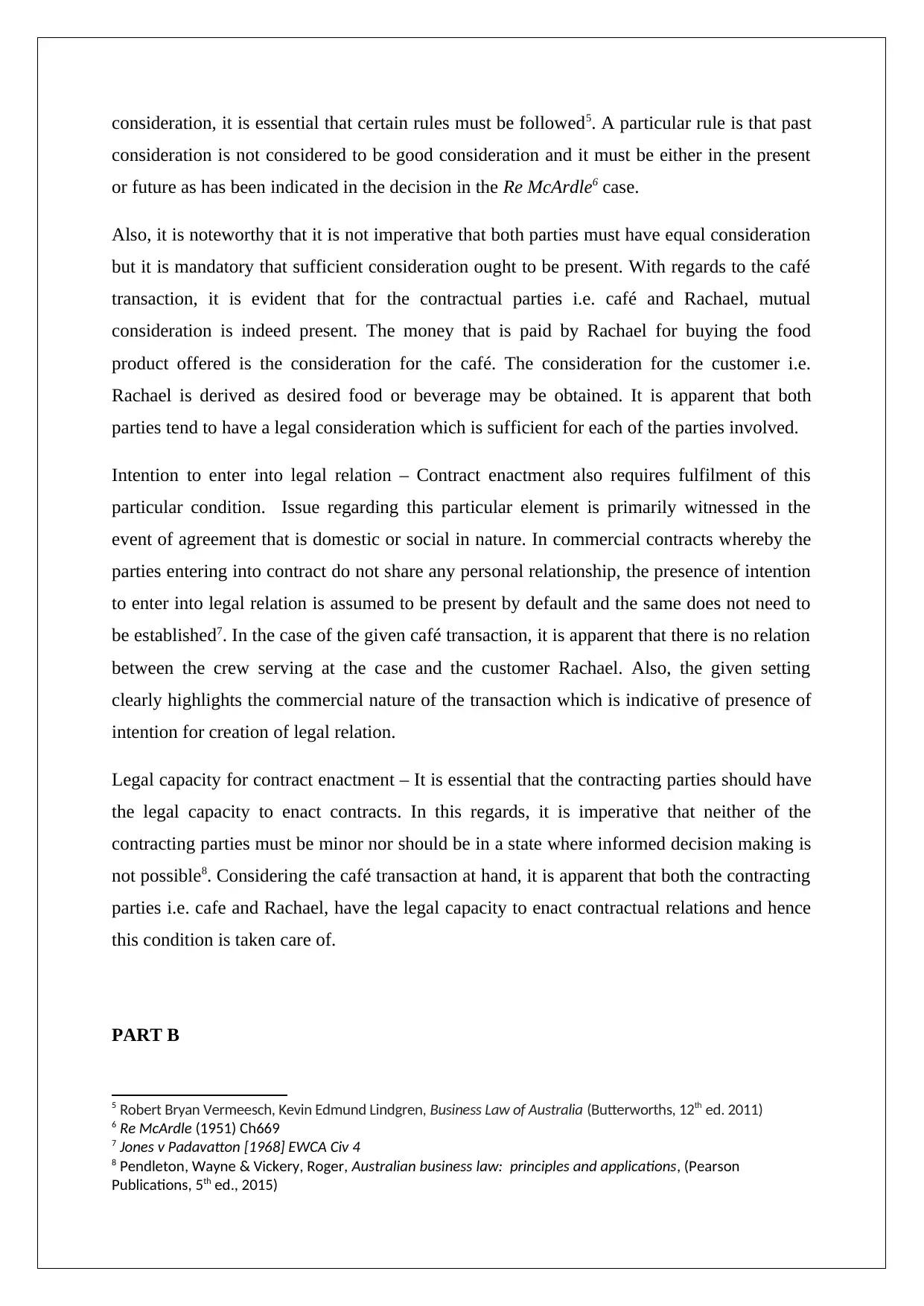
consideration, it is essential that certain rules must be followed5. A particular rule is that past
consideration is not considered to be good consideration and it must be either in the present
or future as has been indicated in the decision in the Re McArdle6 case.
Also, it is noteworthy that it is not imperative that both parties must have equal consideration
but it is mandatory that sufficient consideration ought to be present. With regards to the café
transaction, it is evident that for the contractual parties i.e. café and Rachael, mutual
consideration is indeed present. The money that is paid by Rachael for buying the food
product offered is the consideration for the café. The consideration for the customer i.e.
Rachael is derived as desired food or beverage may be obtained. It is apparent that both
parties tend to have a legal consideration which is sufficient for each of the parties involved.
Intention to enter into legal relation – Contract enactment also requires fulfilment of this
particular condition. Issue regarding this particular element is primarily witnessed in the
event of agreement that is domestic or social in nature. In commercial contracts whereby the
parties entering into contract do not share any personal relationship, the presence of intention
to enter into legal relation is assumed to be present by default and the same does not need to
be established7. In the case of the given café transaction, it is apparent that there is no relation
between the crew serving at the case and the customer Rachael. Also, the given setting
clearly highlights the commercial nature of the transaction which is indicative of presence of
intention for creation of legal relation.
Legal capacity for contract enactment – It is essential that the contracting parties should have
the legal capacity to enact contracts. In this regards, it is imperative that neither of the
contracting parties must be minor nor should be in a state where informed decision making is
not possible8. Considering the café transaction at hand, it is apparent that both the contracting
parties i.e. cafe and Rachael, have the legal capacity to enact contractual relations and hence
this condition is taken care of.
PART B
5 Robert Bryan Vermeesch, Kevin Edmund Lindgren, Business Law of Australia (Butterworths, 12th ed. 2011)
6 Re McArdle (1951) Ch669
7 Jones v Padavatton [1968] EWCA Civ 4
8 Pendleton, Wayne & Vickery, Roger, Australian business law: principles and applications, (Pearson
Publications, 5th ed., 2015)
consideration is not considered to be good consideration and it must be either in the present
or future as has been indicated in the decision in the Re McArdle6 case.
Also, it is noteworthy that it is not imperative that both parties must have equal consideration
but it is mandatory that sufficient consideration ought to be present. With regards to the café
transaction, it is evident that for the contractual parties i.e. café and Rachael, mutual
consideration is indeed present. The money that is paid by Rachael for buying the food
product offered is the consideration for the café. The consideration for the customer i.e.
Rachael is derived as desired food or beverage may be obtained. It is apparent that both
parties tend to have a legal consideration which is sufficient for each of the parties involved.
Intention to enter into legal relation – Contract enactment also requires fulfilment of this
particular condition. Issue regarding this particular element is primarily witnessed in the
event of agreement that is domestic or social in nature. In commercial contracts whereby the
parties entering into contract do not share any personal relationship, the presence of intention
to enter into legal relation is assumed to be present by default and the same does not need to
be established7. In the case of the given café transaction, it is apparent that there is no relation
between the crew serving at the case and the customer Rachael. Also, the given setting
clearly highlights the commercial nature of the transaction which is indicative of presence of
intention for creation of legal relation.
Legal capacity for contract enactment – It is essential that the contracting parties should have
the legal capacity to enact contracts. In this regards, it is imperative that neither of the
contracting parties must be minor nor should be in a state where informed decision making is
not possible8. Considering the café transaction at hand, it is apparent that both the contracting
parties i.e. cafe and Rachael, have the legal capacity to enact contractual relations and hence
this condition is taken care of.
PART B
5 Robert Bryan Vermeesch, Kevin Edmund Lindgren, Business Law of Australia (Butterworths, 12th ed. 2011)
6 Re McArdle (1951) Ch669
7 Jones v Padavatton [1968] EWCA Civ 4
8 Pendleton, Wayne & Vickery, Roger, Australian business law: principles and applications, (Pearson
Publications, 5th ed., 2015)
⊘ This is a preview!⊘
Do you want full access?
Subscribe today to unlock all pages.

Trusted by 1+ million students worldwide
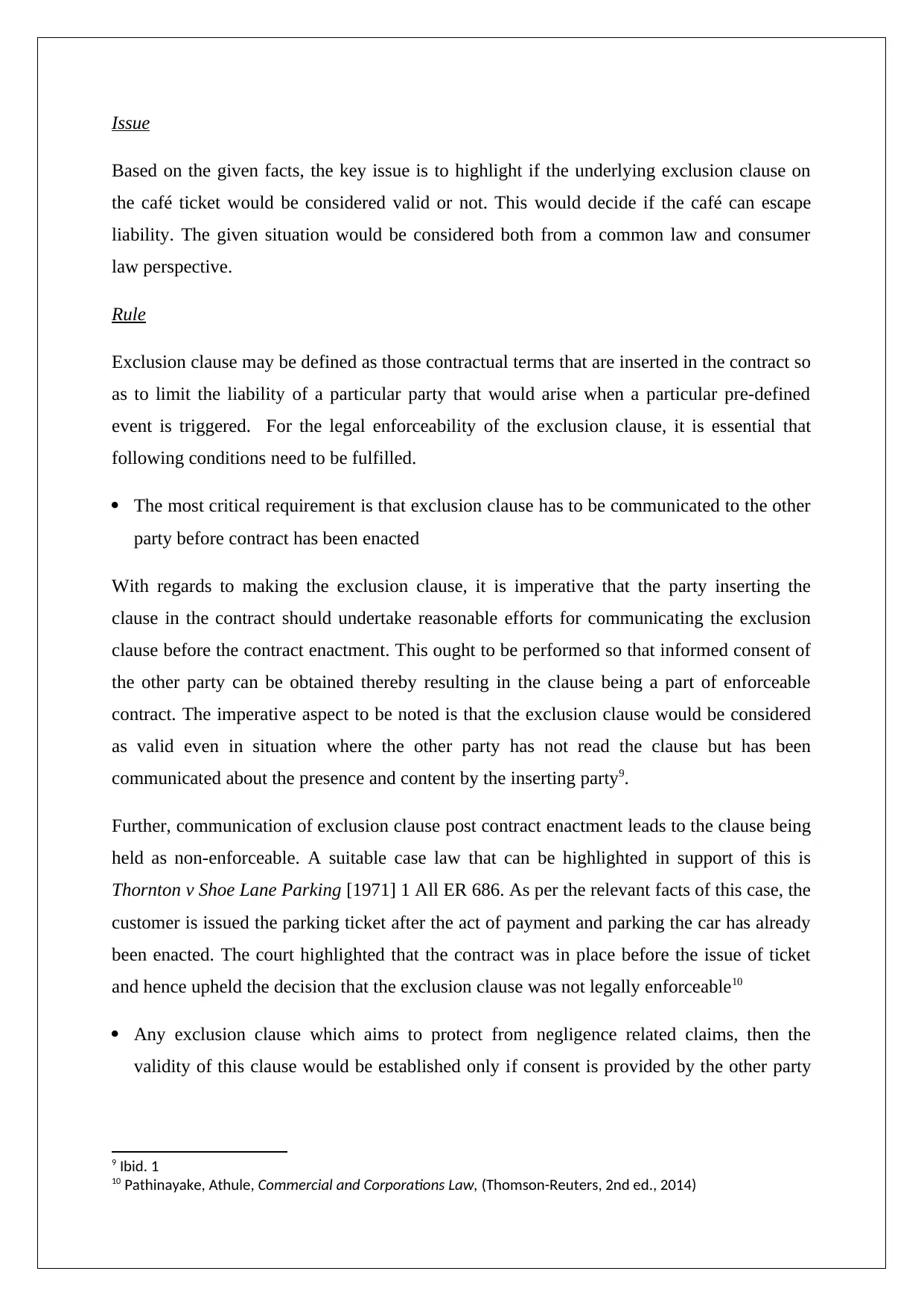
Issue
Based on the given facts, the key issue is to highlight if the underlying exclusion clause on
the café ticket would be considered valid or not. This would decide if the café can escape
liability. The given situation would be considered both from a common law and consumer
law perspective.
Rule
Exclusion clause may be defined as those contractual terms that are inserted in the contract so
as to limit the liability of a particular party that would arise when a particular pre-defined
event is triggered. For the legal enforceability of the exclusion clause, it is essential that
following conditions need to be fulfilled.
The most critical requirement is that exclusion clause has to be communicated to the other
party before contract has been enacted
With regards to making the exclusion clause, it is imperative that the party inserting the
clause in the contract should undertake reasonable efforts for communicating the exclusion
clause before the contract enactment. This ought to be performed so that informed consent of
the other party can be obtained thereby resulting in the clause being a part of enforceable
contract. The imperative aspect to be noted is that the exclusion clause would be considered
as valid even in situation where the other party has not read the clause but has been
communicated about the presence and content by the inserting party9.
Further, communication of exclusion clause post contract enactment leads to the clause being
held as non-enforceable. A suitable case law that can be highlighted in support of this is
Thornton v Shoe Lane Parking [1971] 1 All ER 686. As per the relevant facts of this case, the
customer is issued the parking ticket after the act of payment and parking the car has already
been enacted. The court highlighted that the contract was in place before the issue of ticket
and hence upheld the decision that the exclusion clause was not legally enforceable10
Any exclusion clause which aims to protect from negligence related claims, then the
validity of this clause would be established only if consent is provided by the other party
9 Ibid. 1
10 Pathinayake, Athule, Commercial and Corporations Law, (Thomson-Reuters, 2nd ed., 2014)
Based on the given facts, the key issue is to highlight if the underlying exclusion clause on
the café ticket would be considered valid or not. This would decide if the café can escape
liability. The given situation would be considered both from a common law and consumer
law perspective.
Rule
Exclusion clause may be defined as those contractual terms that are inserted in the contract so
as to limit the liability of a particular party that would arise when a particular pre-defined
event is triggered. For the legal enforceability of the exclusion clause, it is essential that
following conditions need to be fulfilled.
The most critical requirement is that exclusion clause has to be communicated to the other
party before contract has been enacted
With regards to making the exclusion clause, it is imperative that the party inserting the
clause in the contract should undertake reasonable efforts for communicating the exclusion
clause before the contract enactment. This ought to be performed so that informed consent of
the other party can be obtained thereby resulting in the clause being a part of enforceable
contract. The imperative aspect to be noted is that the exclusion clause would be considered
as valid even in situation where the other party has not read the clause but has been
communicated about the presence and content by the inserting party9.
Further, communication of exclusion clause post contract enactment leads to the clause being
held as non-enforceable. A suitable case law that can be highlighted in support of this is
Thornton v Shoe Lane Parking [1971] 1 All ER 686. As per the relevant facts of this case, the
customer is issued the parking ticket after the act of payment and parking the car has already
been enacted. The court highlighted that the contract was in place before the issue of ticket
and hence upheld the decision that the exclusion clause was not legally enforceable10
Any exclusion clause which aims to protect from negligence related claims, then the
validity of this clause would be established only if consent is provided by the other party
9 Ibid. 1
10 Pathinayake, Athule, Commercial and Corporations Law, (Thomson-Reuters, 2nd ed., 2014)
Paraphrase This Document
Need a fresh take? Get an instant paraphrase of this document with our AI Paraphraser
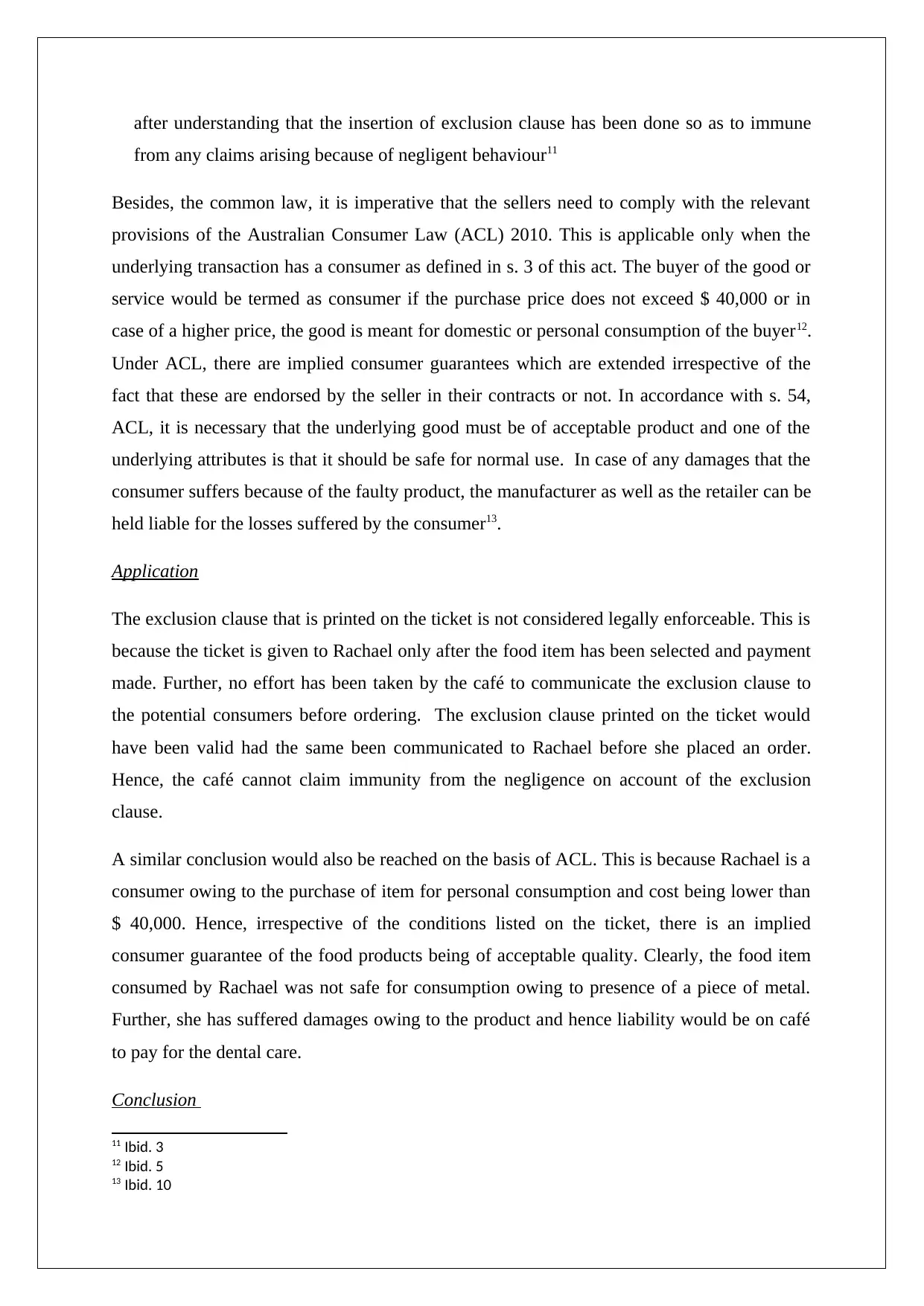
after understanding that the insertion of exclusion clause has been done so as to immune
from any claims arising because of negligent behaviour11
Besides, the common law, it is imperative that the sellers need to comply with the relevant
provisions of the Australian Consumer Law (ACL) 2010. This is applicable only when the
underlying transaction has a consumer as defined in s. 3 of this act. The buyer of the good or
service would be termed as consumer if the purchase price does not exceed $ 40,000 or in
case of a higher price, the good is meant for domestic or personal consumption of the buyer12.
Under ACL, there are implied consumer guarantees which are extended irrespective of the
fact that these are endorsed by the seller in their contracts or not. In accordance with s. 54,
ACL, it is necessary that the underlying good must be of acceptable product and one of the
underlying attributes is that it should be safe for normal use. In case of any damages that the
consumer suffers because of the faulty product, the manufacturer as well as the retailer can be
held liable for the losses suffered by the consumer13.
Application
The exclusion clause that is printed on the ticket is not considered legally enforceable. This is
because the ticket is given to Rachael only after the food item has been selected and payment
made. Further, no effort has been taken by the café to communicate the exclusion clause to
the potential consumers before ordering. The exclusion clause printed on the ticket would
have been valid had the same been communicated to Rachael before she placed an order.
Hence, the café cannot claim immunity from the negligence on account of the exclusion
clause.
A similar conclusion would also be reached on the basis of ACL. This is because Rachael is a
consumer owing to the purchase of item for personal consumption and cost being lower than
$ 40,000. Hence, irrespective of the conditions listed on the ticket, there is an implied
consumer guarantee of the food products being of acceptable quality. Clearly, the food item
consumed by Rachael was not safe for consumption owing to presence of a piece of metal.
Further, she has suffered damages owing to the product and hence liability would be on café
to pay for the dental care.
Conclusion
11 Ibid. 3
12 Ibid. 5
13 Ibid. 10
from any claims arising because of negligent behaviour11
Besides, the common law, it is imperative that the sellers need to comply with the relevant
provisions of the Australian Consumer Law (ACL) 2010. This is applicable only when the
underlying transaction has a consumer as defined in s. 3 of this act. The buyer of the good or
service would be termed as consumer if the purchase price does not exceed $ 40,000 or in
case of a higher price, the good is meant for domestic or personal consumption of the buyer12.
Under ACL, there are implied consumer guarantees which are extended irrespective of the
fact that these are endorsed by the seller in their contracts or not. In accordance with s. 54,
ACL, it is necessary that the underlying good must be of acceptable product and one of the
underlying attributes is that it should be safe for normal use. In case of any damages that the
consumer suffers because of the faulty product, the manufacturer as well as the retailer can be
held liable for the losses suffered by the consumer13.
Application
The exclusion clause that is printed on the ticket is not considered legally enforceable. This is
because the ticket is given to Rachael only after the food item has been selected and payment
made. Further, no effort has been taken by the café to communicate the exclusion clause to
the potential consumers before ordering. The exclusion clause printed on the ticket would
have been valid had the same been communicated to Rachael before she placed an order.
Hence, the café cannot claim immunity from the negligence on account of the exclusion
clause.
A similar conclusion would also be reached on the basis of ACL. This is because Rachael is a
consumer owing to the purchase of item for personal consumption and cost being lower than
$ 40,000. Hence, irrespective of the conditions listed on the ticket, there is an implied
consumer guarantee of the food products being of acceptable quality. Clearly, the food item
consumed by Rachael was not safe for consumption owing to presence of a piece of metal.
Further, she has suffered damages owing to the product and hence liability would be on café
to pay for the dental care.
Conclusion
11 Ibid. 3
12 Ibid. 5
13 Ibid. 10
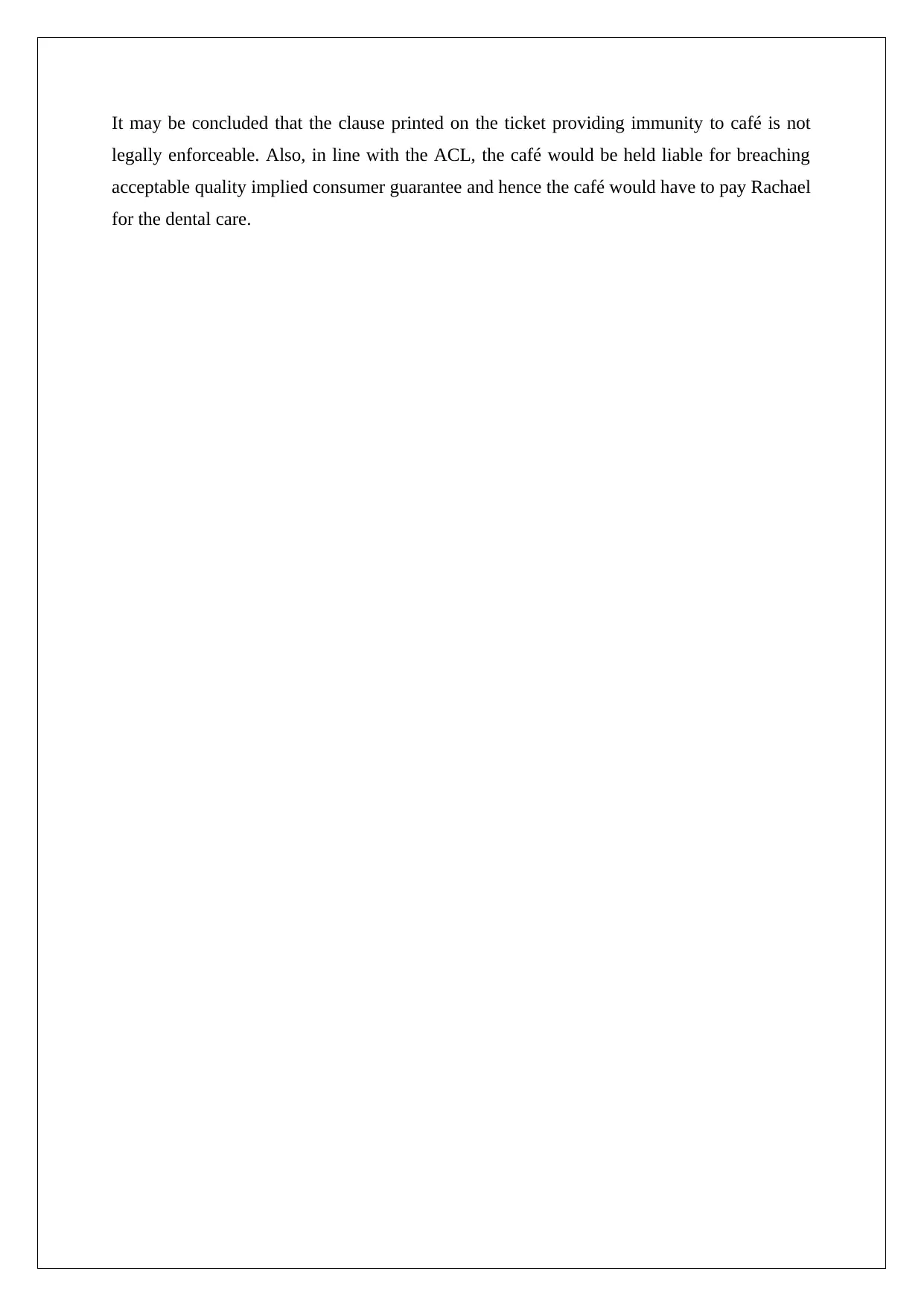
It may be concluded that the clause printed on the ticket providing immunity to café is not
legally enforceable. Also, in line with the ACL, the café would be held liable for breaching
acceptable quality implied consumer guarantee and hence the café would have to pay Rachael
for the dental care.
legally enforceable. Also, in line with the ACL, the café would be held liable for breaching
acceptable quality implied consumer guarantee and hence the café would have to pay Rachael
for the dental care.
⊘ This is a preview!⊘
Do you want full access?
Subscribe today to unlock all pages.

Trusted by 1+ million students worldwide
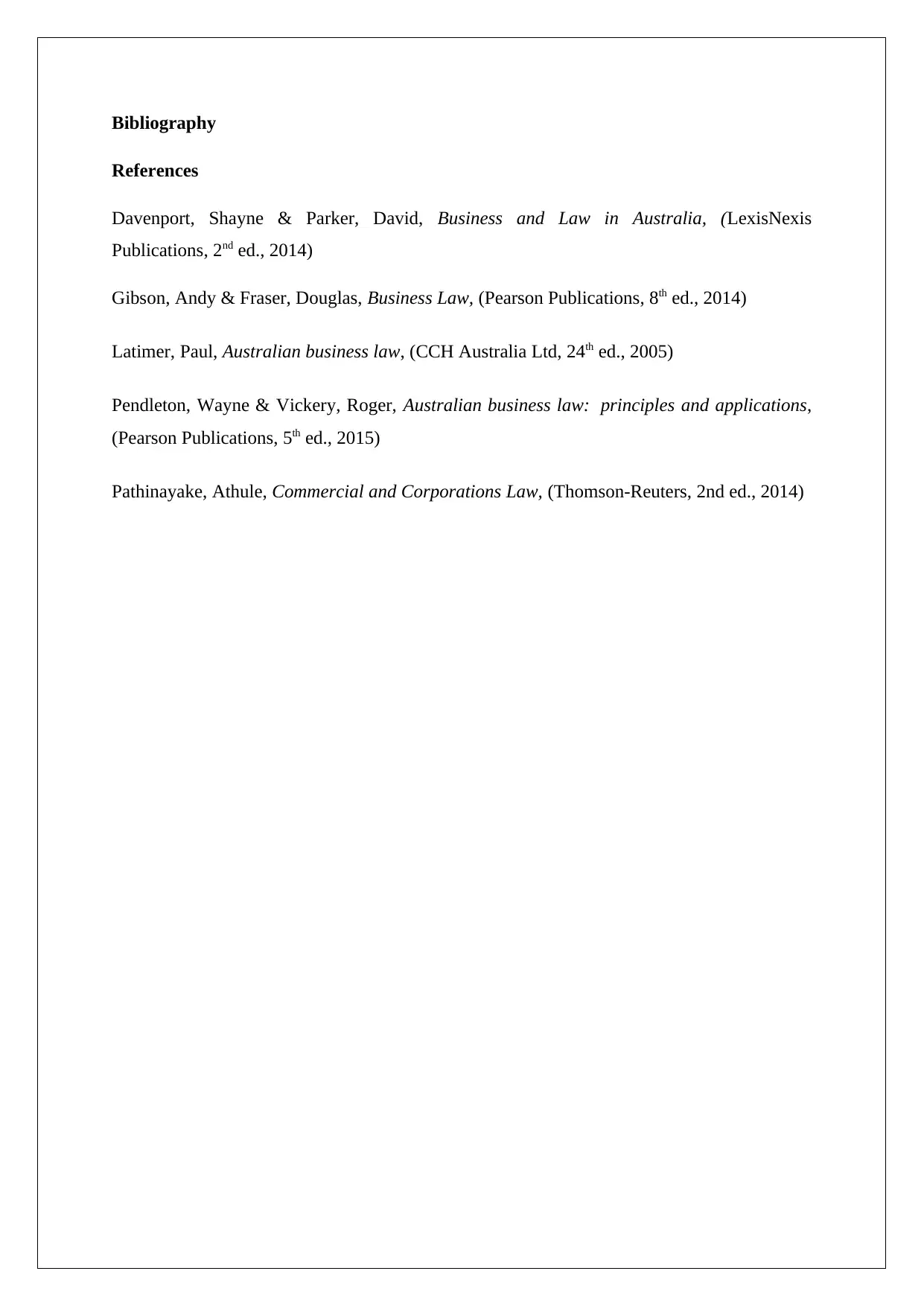
Bibliography
References
Davenport, Shayne & Parker, David, Business and Law in Australia, (LexisNexis
Publications, 2nd ed., 2014)
Gibson, Andy & Fraser, Douglas, Business Law, (Pearson Publications, 8th ed., 2014)
Latimer, Paul, Australian business law, (CCH Australia Ltd, 24th ed., 2005)
Pendleton, Wayne & Vickery, Roger, Australian business law: principles and applications,
(Pearson Publications, 5th ed., 2015)
Pathinayake, Athule, Commercial and Corporations Law, (Thomson-Reuters, 2nd ed., 2014)
References
Davenport, Shayne & Parker, David, Business and Law in Australia, (LexisNexis
Publications, 2nd ed., 2014)
Gibson, Andy & Fraser, Douglas, Business Law, (Pearson Publications, 8th ed., 2014)
Latimer, Paul, Australian business law, (CCH Australia Ltd, 24th ed., 2005)
Pendleton, Wayne & Vickery, Roger, Australian business law: principles and applications,
(Pearson Publications, 5th ed., 2015)
Pathinayake, Athule, Commercial and Corporations Law, (Thomson-Reuters, 2nd ed., 2014)
1 out of 7
Related Documents
Your All-in-One AI-Powered Toolkit for Academic Success.
+13062052269
info@desklib.com
Available 24*7 on WhatsApp / Email
![[object Object]](/_next/static/media/star-bottom.7253800d.svg)
Unlock your academic potential
Copyright © 2020–2026 A2Z Services. All Rights Reserved. Developed and managed by ZUCOL.




